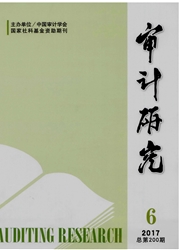

 中文摘要:
中文摘要:
针对政府审计部门化制度改造的实践,本文在罗伯特·西蒙斯(美)的“跨距评估”和安索夫的组织结构柔性化理论分析框架下,运用流程分析理论对政府审计作业模式的演进、优化问题进行了系统分析,所得研究观点主要有:基于目标利益的非一致性,政府审计监管的重点在于审计活动自身;根据“影响跨距”需求因素与“控制跨距”供给因素的平衡分析,审计业务权属分离虽然能增进审计效率,但要注意流程分化适度问题,否则会导致组织协调障碍;在审计业务流程之间构建合作机制、信息反馈机制有助降低组织协调成本,柔性工作组是增进审计效率、开展业务增值型审计的理想制度构件。
 英文摘要:
英文摘要:
This paper analyzed systematically the evolution and optimization of government audit procedure in terms of the departmentalizaiton institutional reformation practice of government audit through using procedure optimization theory, under the theories of Cross-Distance Evaluation and organizational flexibility, and research opinions are following: the supervision emphasis of government audit should be the audit self action because of objective benefit difference between auditor and person audited; although audit procedure's decentralization can bring audit with efficiency, the decentralization degree should be controlled according to the balance analysis between influence cross-distance demand factors and control cross-distance supply factors, other wise, organization coordination obstacle would be occurred; it is beneficial to constitute cooperative and information reflective mechanism between different audit procedures for decreasing the organizational coordination cost, and flexibility work crew model are ideal institution attachments to add the audit efficiency and carry out value-adding oriented audit.
 同期刊论文项目
同期刊论文项目
 同项目期刊论文
同项目期刊论文
 期刊信息
期刊信息
